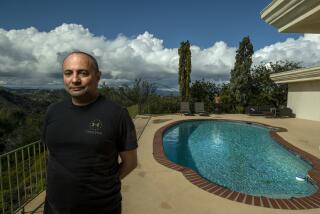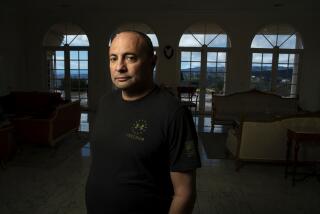Russian Communist’s Campaign Downshifts
- Share via
MOSCOW — In these do-or-die days of political horse-trading ahead of the July 3 presidential runoff, Communist challenger Gennady A. Zyuganov appears to have gone out of business.
He has no plans to hit the hustings or blanket the airwaves with any fresh message, and on Monday the underdog candidate proposed a power-sharing arrangement with his opponent, President Boris N. Yeltsin, that provoked reactions ranging from silence to rejection.
“I propose to create a Council of National Accord that would absorb all the influential political forces [and] public and nongovernmental structures,” Zyuganov told journalists at his third news conference in four days, a Soviet-style appearance at which no questions were permitted.
Zyuganov mentioned the possible inclusion of Moscow’s wildly popular mayor, Yuri M. Luzhkov, and of Murtaza G. Rakhimov, the president of the autonomous Bashkir republic. Luzhkov immediately reiterated his support for Yeltsin, and Rakhimov called the Communist’s suggestion of an alliance “a provocation.”
The omission of any current administration officials from Zyuganov’s list of ideal coalition partners gave the proposal little chance of being taken seriously by the front-running Yeltsin.
Even other Yeltsin rivals took the plea as a sign of weakness.
“I think Zyuganov really fears very much a possible defeat at the polls, and he has every reason to fear that,” said Grigory A. Yavlinsky, the liberal economist who finished fourth in the June 16 first-round ballot with 7.5% of the vote.
The prickly Yavlinsky has held back full endorsement of Yeltsin, urging his supporters to go to the polls even if only to vote against both runoff candidates.
*
On Monday, Yavlinsky appealed to Yeltsin to reassure pro-reform voters about his policy goals for a second term as president so that the Yabloko party Yavlinsky heads can give the incumbent its full support before the final vote.
But “never and under no circumstances can Yabloko support the Communist Party in the presidential elections,” Yavlinsky vowed. “Yabloko will conduct determined work to prevent the Communist Party from coming to power in Russia at the July 3 elections.”
Active campaigning has been authorized since the first-round results were made official Thursday. The Communist challenger, however, has not made any public appearances except for his news conferences since finishing a close second in the initial balloting, with 32% to Yeltsin’s 35%.
The first-round totals indicated that Zyuganov has failed to build on the wave of Communist nostalgia that gave the former ruling party the largest share of seats in the Duma, the lower house of parliament, in the December parliamentary elections. Slightly fewer than the 25 million Russians who voted for Communist deputies and their ideological allies six months ago supported Zyuganov for the presidency.
Meanwhile, Yeltsin has aggressively courted the huge electorate that wanted neither him nor Zyuganov in the first round. One-third of those who cast ballots then backed candidates no longer in contention, and 30% of Russia’s eligible voters didn’t come to the polls at all.
Visibly tired from the grueling contest, Yeltsin nonetheless spent the weekend on the stump in the Baltic Sea port of Kaliningrad and the former Soviet republic of Belarus--the latter visit intended to highlight his concern about relations with the “near abroad.” His staff says he plans to visit the Volga River city of Samara this week.
Zyuganov, apparently, has a different strategy. “He is not going anywhere before the second round on July 3,” campaign spokesman Mikhail M. Molodtsov confirmed Monday.
The Communist’s long huddle has prompted some analysts to conclude that Zyuganov has given up his hopes of winning the presidency and will instead work to preserve his party’s influence through its domination of the Duma.
Opinion polls in Russia are often wide of the mark, but the latest forecasts give the challenger reason to feel resigned.
On Sunday, the All-Russian Center for the Study of Public Opinion projected a landslide for Yeltsin in the runoff, giving him 53% compared with 34% for Zyuganov. Another poll, by the Public Opinion Fund, gave Yeltsin 47% to 27% for Zyuganov.
More to Read
Sign up for Essential California
The most important California stories and recommendations in your inbox every morning.
You may occasionally receive promotional content from the Los Angeles Times.














